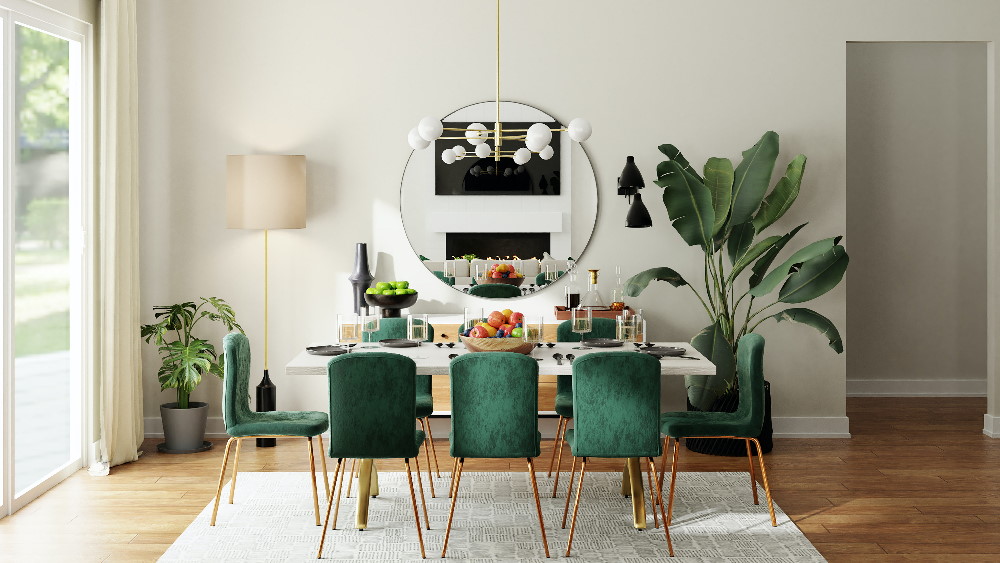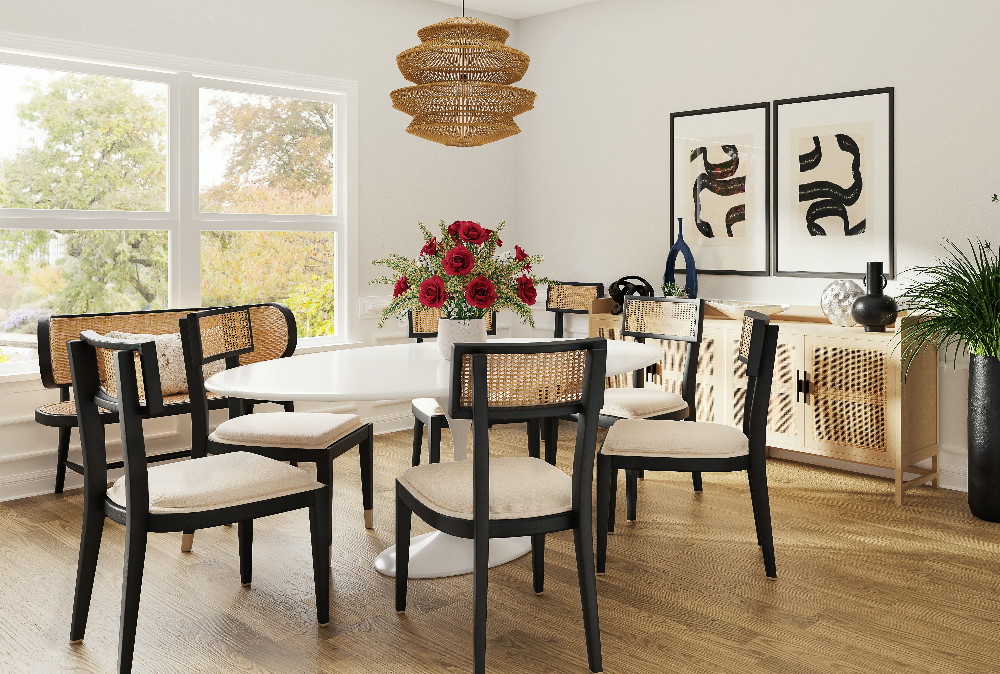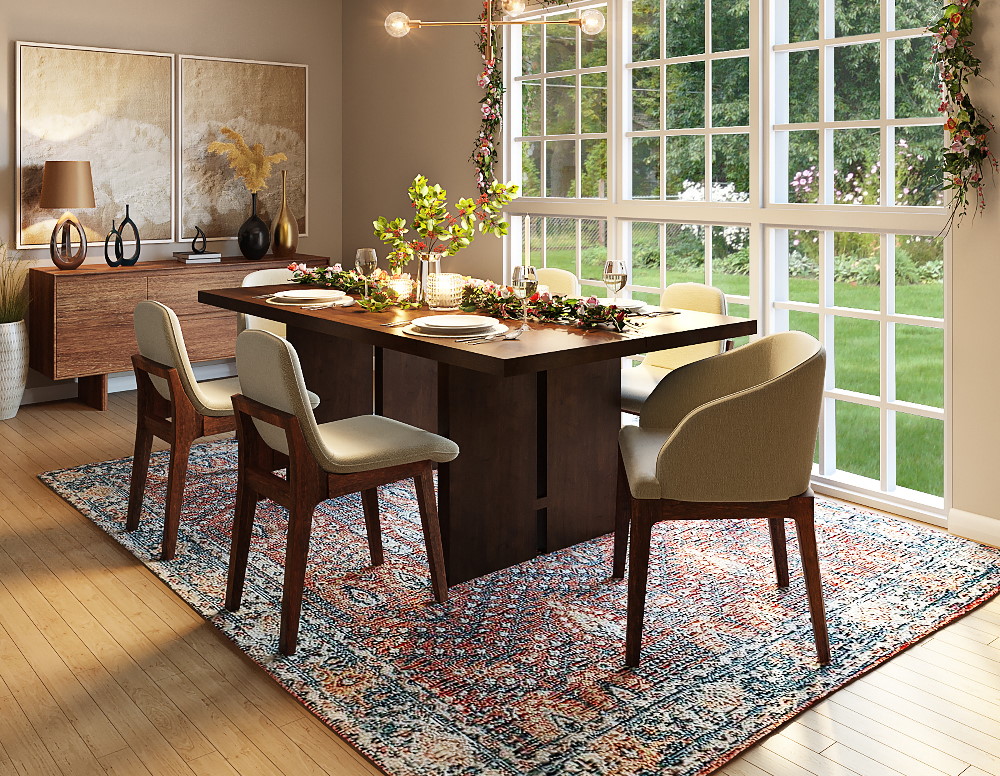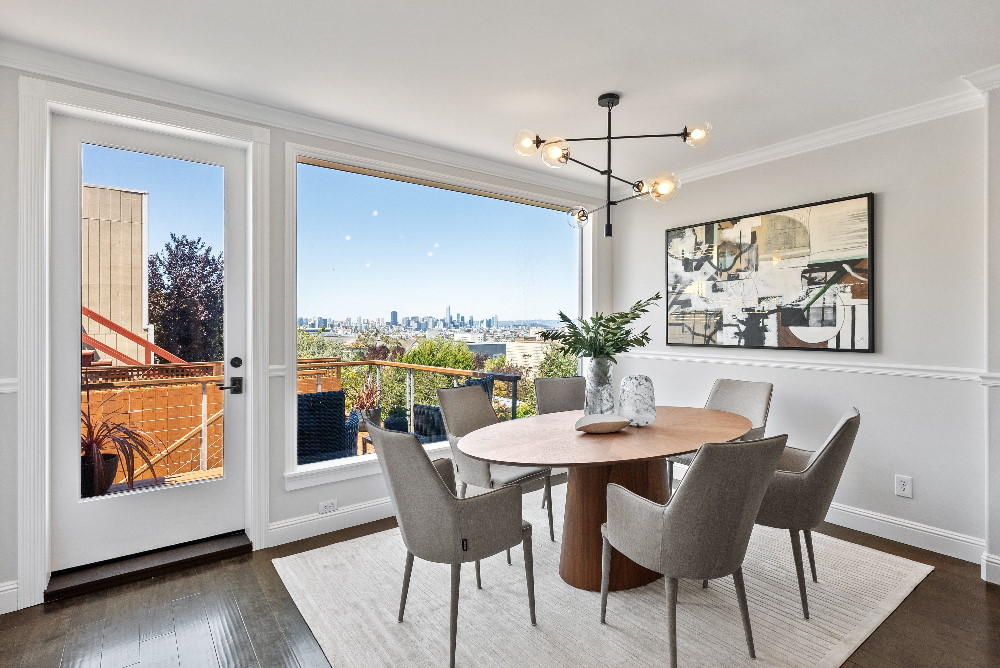16 Effective Steps to Improve the Feng Shui of your Dining Room.

Dr. Michael Oon

The dining room is pivotal to the harmony of the family or people within a household. Hence the need to look at the feng shui of your Dining Room.
An auspiciously oriented dining area is wealth-enhancing and a centre for family bonding. Eating is a social occasion for the Chinese, and food plays a very important part in Chinese culture. It is essential that the family should eat at least one meal a day together to create harmony in the home. Unlike the Western concept of one serving per person, Chinese meals are taken communally with several dishes shared by the diners at the same table.

Step 1 Shape of the Room for the Feng Shui of your Dining Room
According to feng shui theory, the dining room, like other rooms in the home, should be regular in shape with no missing areas or protruding corners. A rectangular or square room is most auspicious (and easy to decorate).
Step 2 Location
Ideally, a dining room should be located between the living room and the kitchen, making it the heart of the household. This will create greater harmony between parents and offspring. It is deemed very inauspicious if a dining area is placed directly underneath a toilet on the upper floor: as this 'wet room' would suppress the Good Luck in the dining room. If you live in a flat, try to find out the layout of the flat above, to avoid placing your dining area directly under a toilet or kitchen.
Step 3 Decor
The energy of the household is fuelled through the food served. As this is an area for serving food, the fuel of life, it is closely connected with the status and prosperity of the family. An abundance of yang energy is highly recommended here to enhance this aspect of feng shui by imbuing the ambience with bright colours, lights - especially from crystal chandeliers - and candles to encourage the Fire Element livened up by music and cheerful decor. Plants placed here will further enhance the yang energy and represent the growth of good fortune for the family.
Step 4 Inauspicious Locations
Ideally, a dining room should be located in the centre of the house, not in direct view of the front door and without a direct line of sight to the front door. There are some configurations that should be avoided. For example, if a house has a split-level design, the dining room should be located on a higher level.
Windows on opposite walls in a dining room, in direct alignment with each other, should be avoided if possible because they cause rapid movement of ch'i from one window to another, and this will not benefit the home. Avoid using a room next to the toilet as a dining area. This is common sense as well as good feng shui. If this is unavoidable, make sure the dining table is placed well away from the common wall shared with the toilet.
Step 5 Ying And Yang
Create a balance of yin and yang energy in this room, with a bias towards yang. To create more yang energy, ying objects such as ancestral portraits or antique furniture should not be displayed or used in this area. Excessive coldness from yin energy will hamper the growth and luck of the home. On the other hand, if the room is subject to too much sunlight or bright 'lights, the excess of yang energy will 'burn out' the residents, causing arguments and upsetting their equanimity.
Step 6 Poison Arrows
Check for 'poison arrows'. Negative ch'i emanates from sharp corners or a single exposed beam. Sharp corners should be softened with plants or furniture. Avoid sitting directly under a single large beam if one is present in the ceiling. If this cannot be avoided, suspend two identical bamboo flutes on red strings on the beam, slanting them at 45 degrees towards each other at the top, and making sure the mouthpieces are placed at the bottom end. This will help raise the energy of the beam and reduce the negative vibrations from this poison arrow harming the residents. Alternatively, install up-lighters and direct the light towards the offending beam for the same effect.
Step 7 Best Table Shapes
Examine shapes that play an essential part in all feng shui, especially the shape of the dining table. Ideally, a dining table should be round or oval, devoid of sharp corners. It symbolises prosperity and unity within the family unit. If a dining room has a rectangular or square table, refrain from sitting at the corners to avoid sha ch'i which is generated by the sharp corners.
Step 8 Lucky Seating
Check the number of place settings as this will affect the luck of the residents. Ideally, six, eight, or even nine are considered lucky - because odd numbers are yang. Of course, since household numbers tend to be fixed, then your number of place settings cannot be altered on a daily basis, but if inviting guests to dinner, keep these auspicious numbers in mind as you make your arrangements.
Step 9 Facing Directions
Each member of the family should try to orient their seat to face one of their personal auspicious four Directions based on their Kua number. Orientate the patriarch of the house, if he is the main breadwinner, to face his sheng ch'i or best Direction of Prosperity & Abundance, as he is responsible for providing the food on the table.
The matriarch of the home should tap into her third-best Direction of Nien Yen, which represents family harmony. A mother's role in a traditional home is to keep the family in harmony by bringing up the children and caring for them.
Children of school age would benefit by sitting facing their fourth-best Directions of Fu Wei to tap into their Education & Inner Knowledge Luck to aid them in their studies. Elderly members of the family would enjoy good health prospects if they sat facing their second-best Direction of Tien Yi, lyrically known as 'doctor from heaven' or best Health Direction.
Step 10 Mirror Placement
Place a mirror strategically in the dining area to reflect the food on the table and symbolise the doubling of wealth. This is the only place in the house where a mirror should be placed to reflect the food. In the practice of authentic Chinese Feng Shui, it is very unlucky to place a mirror near a stove in an attempt to reflect the food being cooked, as this provokes 'fire at heaven's gate', which encourages the prospect of a disaster such as accidents or fire in the house. Besides, it is very impractical to place a mirror in the cooking area as steam and oil mean constant cleaning.
Step 11 Luck Symbols
Enhance feng shui luck by placing various lucky symbols in a room. In the dining area, it is very auspicious to display the Chinese 'three luck gods' known as Fuk Luk and Sau. They represent wealth, health and longevity. If they are also reflected in the mirror on the wall, it will double their luck-bringing properties.
Paintings of fruits and food on the dining room wall are said to enhance Prosperity Luck. Fruits such as oranges represent wealth as the word for 'oranges' puns with the word for 'gold' in some Chinese dialects.
Peaches symbolise longevity and good health, while pomegranates represent fertility and descendant Luck with their abundance of seeds. Pictures of longevity such as cranes, bamboo, or deer are also lucky symbols for the dining area to enhance the health of the diners.
Step 12 Auspicious Cutlery
In traditional Chinese homes, the eating tools are chopsticks and spoons with rounded edges. Sharp instruments like knives and forks are forbidden, as they are considered hostile and unfriendly.
Round bowls and serving plates - usually with designs symbolising prosperity such as dragons, bats, fish or peaches - are used to serve food. The bat is called Ju in Chinese puns with the word for luck itself.
Dainty porcelain cups with the same motif are used for serving Chinese tea. This is a popular beverage to accompany meals, as the Chinese believe that tea has fat-removing and cleansing properties.
Step 13 Plants:
The Dining Room is an auspicious location as the family is not only bonding but eating together. What could be better than supplementing the energy in the room with auspicious plants.
You could have the money plant with its thick leaves symbolising the gaining of wealth.
The other plant is the peace plant. I do not need to elaborate any more on this, but it encourages family harmony.
Step 14 Lighting
The Dining Room is used for many purposes – an eating area or dining area. Therefore, there should be various types of lighting for different purposes.
With the use of a dimmer light switch, the room can be dimly lit should there be a need for a “candlelight” event or turned up for full brightness for daily use.
Step 15 Images In the Feng Shui of your Dining Room
The Dining room is a place where the family assembles to share a meal. This is also a place where thoughts or aims for the future.
This is the ideal place to have images of aims and aspirations. These images can trigger discussion of these topics. It is a means to keep the discussion of the subject alive.
Avoid images of troubles, crashes or disasters. This is an inappropriate location for them.
Step 16 Propitious Traditions
In any society, it is impolite and unlucky to have arguments at mealtimes. This is the hour of harmony for the family where the matriarch of the house displays her affection and care for the family by producing the array of food that is lovingly prepared.
In traditional Chinese homes, there is an unspoken hierarchy at the commencement of the meal. If elderly people like grandparents are present at mealtime, the younger members of the family should invite them to start the meal. This is a matter of good manners for the descendants, but ·is also thought to ensure good fortune for the younger generation.
Commentary on the Feng Shui of your Dining Room:
These 16 Effective Steps to Improve the Feng Shui of your Dining Room – are straightforward and easy to implement. This article was written by Michael Oon practises Traditional Feng Shui and is a member of Alliance Feng Shui.
Other Posts that might be of Interest:



